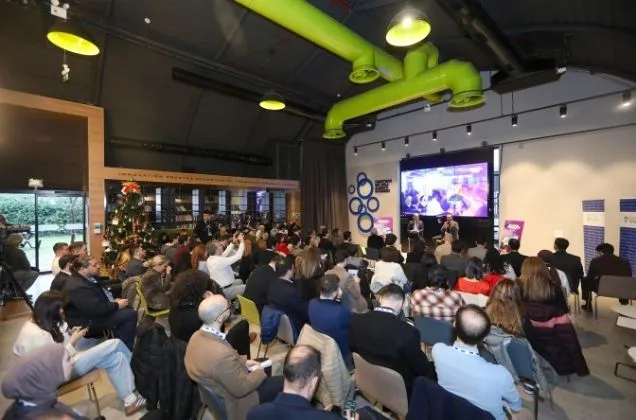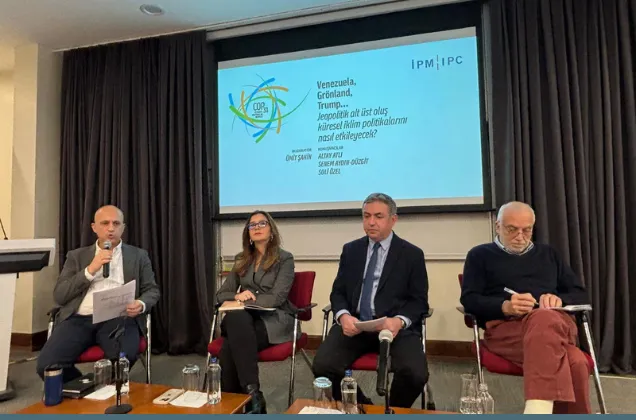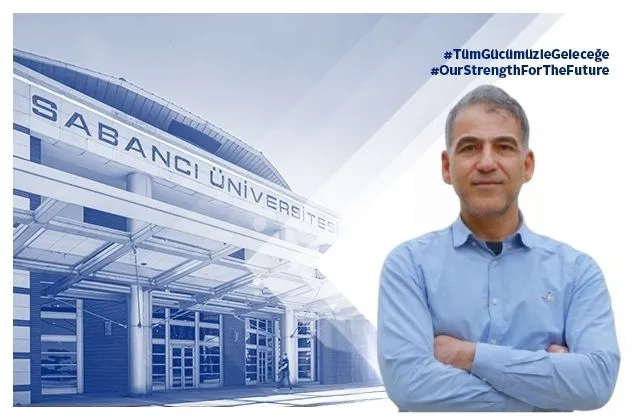13/07/2021
5 TRILLION USD OF ENERGY INVESTMENTS ARE NEEDED FOR ZERO EMISSION BY 2050
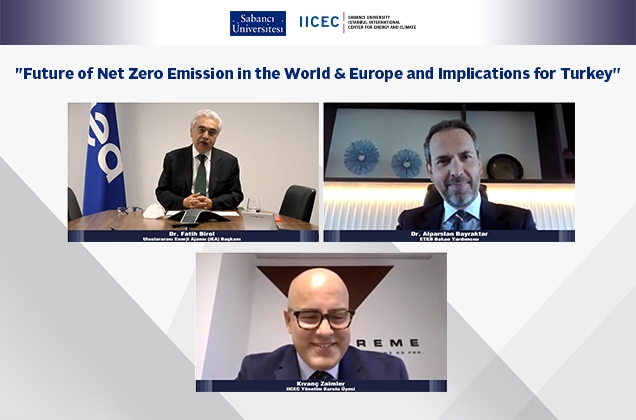
The “Future of Net Zero Emission in the World & Europe and Implications for Turkey” webinar, organized by Sabancı University Istanbul International Center for Energy and Climate (IICEC) took place. With Dr. Alparslan Bayraktar, Deputy Minister of Energy and Natural Resources as the Guest of Honor, the webinar was held with the participation of Kıvanç Zaimler, IICEC Board Member and Dr. Fatih Birol, Executive Director of the International Energy Agency (IEA).
The online event covered how the decisions towards net zero emission would impact the world and Turkey in many fields including industry, commerce, exports and energy transition. Attention was drawn to the fact that to reach the net zero emission target by 2050, the amount of annual energy investments, currently standing at 2 trillion USD, must go up to 5 trillion USD.
The “Future of Net Zero Emission in the World & Europe and Implications for Turkey ” webinar organized by Sabancı University Istanbul International Center for Energy and Climate (IICEC) brought together leaders from government and industry on energy and climate matters.
The Opening Speech was delivered by Kıvanç Zaimler, IICEC Board Member, and the Keynote Speech by Dr. Fatih Birol, Executive Director of the International Energy Agency (IEA). The Guest of Honor of the webinar was Dr. Alparslan Bayraktar, Deputy Minister of Energy and Natural Resources.
During the opening speech of the webinar, Kıvanç Zaimler, Member of the IICEC Board of Directors , highlighted that net zero emission has become an agenda focus globally and specifically in the countries that have been trading partners of Turkey, and this trend would impact the energy sector. He continued, “Currently, global and regional dynamics come to the forefront in this very strategic sector and related sectors. It is important to create value for all the stakeholders of the energy sector by managingrisks and turning them into opportunities. We are here to discuss an important subject.”
During his speech in the webinar, Dr. Fatih Birol, Executive Director of the International Energy Agency (IEA), pointed to the raising of climate and environmental awareness in every country and in every segment of society, and added, “This awareness is rising quickly and irreversibly. Climate change has been proven scientifically and became an integral part of the public opinion.” Revealing that 80% of the emissions leading to climate change resulted from the energy sector, Fatih Birol continued, “This being the case, the solution to the problem must come from the energy sector. Without reducing carbon emission in the sector between 2020 and 2050, it is impossible to reach the net zero level. All the major economies in the world, including the EU countries, the USA, Canada, Brazil, the UK, Japan, and South Korea committed to net zero emission by 2050. Can the global energy sector be transformed? The path to this target is extremely challenging, but it is not impossible to get there. It is necessary to make the most of the existing energy technologies, proven to be economical, and accelerate new technologies, which require investments.”
Noting that annual energy investments amounted to 2 trillion USD globally, Dr. Fatih Birol said, “To reach the 2050 targets, the amount of investments must increase to 5 trillion USD annually, and a major part of these investments must go to clean energy technologies. The share of emerging markets in these investments should also grow. If the world reaches the net zero emission target by 2050, the amount of oil consumption will decrease from 100 million barrels a day to 25 million. Consumption of gas and coal will decrease dramatically. Solar will be the number one source of energy by 2050. Electric car sales have a market share of around 5% in the world. To reach the net zero emission target, 60% of vehicles sold in the world must be electric by 2030. By 2040, the global energy sector will be fully decarbonized through the use of renewables, the combination of fossil energy sources with carbon abatement choices, and nuclear energy... I must also specify that to reach the net zero target by 2050, nuclear energy must double up from its current level.”
Clean Energy Awareness and Energy Transformation
Dr. Birol indicated that countries must draw roadmaps considering their specific conditions, particularly level of economic development, energy realities and security of energy supply, and continued, “To find a solution to this global problem, everyone must do their own work remembering that they all have some responsibilities to assume. No country is exempt from the effects of the clean energy transformation. Every country will be impacted by that, because there is a very strong wave coming from the deep. With decreasing costs, major economies including the US and China will be involved in the energy transformation.”
“WE WILL CONTINUE TO CARRY OUT REFORMS TO ATTRACT ENERGY INVESTMENTS”
Dr. Alparslan Bayraktar, Deputy Minister of Energy and Natural Resources pointed out that due to some 4% shrinkage of the global economy as a result of decreased economic activity during the pandemic, carbon emissions had seen a reduction. Dr. Alparslan Bayraktar said, “We call the year 2021 the beginning of a period of recovery. The IEA forecasts a 10% increase in energy investments. We can see that many countries are making commitments to be carbon-neutral by 2050. The EU Climate Law has been issued very recently and the climate issue is now treated through a regulatory framework. I cannot say that I have received serious signs as to how those targets are to be reached. As an emerging country, Turkey is making efforts to fulfill the requirements of the Paris Climate Agreement. Moreover, we have made considerable investments in the field of renewable energy. 53% of Turkey’s total installed electricity capacity is based on renewables. The share of renewables in total electricity generation was 43% last year, while in countries that are very developed in this field like the US, China, German and the UK this share is 17 to 36%. Therefore, Turkey is at a really advanced level in renewable energy. In 2020, we were able to avoid approximately 73 million tons of carbon emissions thanks to power generated from renewables. Turkey faces serious challenges to realize absolute emission reductions in the short to medium term and it does not seem really possible to set any emission reduction target ahead. In economic terms, I can say that for example in 2020, 46 billion TL of support was provided for renewables. The amount of investments in energy efficiency from 2017 to 2020 is close to 5 billion USD. Looking at these figures, we can see the magnitude of the energy transformation bill. Assuming that Turkey has 1% share in global economy, some 40-50 billion USD of the targeted 5 trillion USD of global investments must be realized in Turkey.”
‘‘Business Leaders’ Perspectives: Future of Clean Energy’’ Panel was held.
The “Future of Net Zero Emission in the World & Europe and Implications for Turkey ” webinar, organized by Sabancı University Istanbul International Center for Energy and Climate (IICEC), was followed by a panel entitled “Business Leaders’ Perspectives: Future of Clean Energy.” Moderated by Garanti BBVA EVP Ebru Dildar Edin, the panel had Sinan Ak, CEO of Zorlu Enerji, Enis Amasyalı, CEO of Borusan EnBW Enerji, Ahmet Erdem, Country Chair of Shell Turkey, Zaur Gahramanov, CEO of SOCAR Turkey, and Hakan Yıldırım, CEO of Sanko Enerji, as speakers.
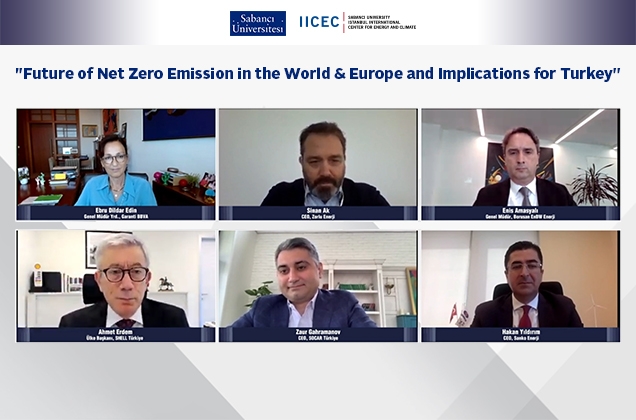
During her opening speech at the panel, Ebru Dildar Edin, Garanti BBVA EVP said, “Net zero has been one of the key topics recently. There is a target to reduce carbon emissions by 45% to keep the global temperature increase at 1.5 degrees. In this panel, we will discuss repercussions and reflections from the private sector.”
Ahmet Erdem, Country Chair of Shell Turkey, stated that Shell, one of the biggest hydrocarbon producers in the world, was headed to the net zero emission by 2050 target. Erdem added, “We aim to decrease the carbon intensity originating from our own operations by 8% by 2023. We will do this by using energy efficiency and renewable energy. We have a plan to reach a 20% target by 2030, 45% by 2035, and 100% by 2050. Our oil production peaked in 2019. By 2030, we aim to reduce oil production by 2% every year. Upon the decrease of oil, nearly 55% or more of the hydrocarbon included in Shell’s portfolio will be natural gas by 2030. We find natural gas important as a fuel for transition. We will see a more common use of gas in road, marine and rail transport. We aim to convert refineries in our facilities to energy parks. We will generate hydrogen by using wind energy. Electric vehicles are developing at tremendous speed. With regards to chemicals, we plan to recycle 1 million tons of plastic waste to transform it to plastic raw materials by 2025.”
Zaur Gahramanov, CEO of SOCAR Turkey emphasized that sustainability should be the main drive for the businesses, and R&D activities should get necessary attention. He continued, “We expect sizeable gains in the field of sustainability thanks to carbon capture, storage and use programs. We have started a big journey both in the world and in Turkey. We have started to make big projects. We have increased R&D investments in Turkey. We collect the fruits of digital transformation. We will realize energy transformation more efficiently thanks to our digital investments. We find digital transformation and technological expansion important, and we will continue to invest in these particular areas. Digital investments make energy transformation more effective. We should continue to work together in the related fields. We should build a roadmap for this.”
Sinan Ak, CEO of Zorlu Enerji said digitalization, electrification and sustainability would shape the future and lead to the net zero target, accompanied by a huge need for investment. He continued, “Renewable energy has now hit the road. Investments are coming. While the number of investors was very small in the past, we can see thousands of investors today. With groundbreaking developments including electric vehicles, the most important subject is digitalization going forward, because digitalization and software are indispensable parts to manage all these systems. Our large companies should definitely pay great attention to software development. We are doing our own bit. As Zorlu Group, we also focus on hydrogen fuels, whose current cost corresponds to the cost of solar panels back in the 2000s. We expect the costs of hydrogen fuel to come down in the near future.”
Enis Amasyalı, CEO of Borusan EnBW Enerji underlined the importance of sustainability and what his company did for it. He added, “As Borusan Group, we built our sustainability strategy on three pillars, which are climate, human and innovation. As Borusan EnBW, the Group’s energy company, we have invested only in renewables since 2009. In this way, we contribute to the climate pillar of our sustainability strategy. Our partner EnBW has recently announced a very ambitions target, and said they would be climate-neutral by 2035. We are the leading wind power generator in Turkey with 661 megawatts. The technology of wind power plants has advanced extremely fast. I can say that our country’s potential for wind energy is well above 100 gigawatts. Sustainable financing, green financing, and green bonds issued at favorable conditions will play a big role in realizing this potential.”
Hakan Yıldırım, CEO of Sanko Enerji underlined that the coming 30 years would be a period of transition to a low carbon economy in the world. He further said, “Whatever our roles or impact areas may be, we want to hand over a more livable world to the next generation. Currently, the global temperature increase is 1.1 degrees and we can feel its effects every single day. This year has been the driest one since 2014, and this affects not only hydro power generation but also agriculture. Therefore, if we want to avoid such extreme weather conditions, we have to keep the global temperature increase below 2 degrees, and ideally below 1.5 degrees. The whole world will invest trillions of dollars in wind, solar, carbon capture, energy storage, and electric vehicles. Therefore, we should do the same build more wind and solar power plants. We should also be making money by technology development, manufacturing and exporting equipment.”
ICEC Director Bora Şekip Güray pointed to the importance of topics such as electrification, renewable energy, hydrogen and digital transformation for the transition to a low carbon economy, and emphasized that IICEC would continue to work in these fields within its mission of “Government-Industry-Academy Success Triangle”.
About Sabancı University Istanbul International Center for Energy and Climate (IICEC): https://iicec.sabanciuniv.edu/about

